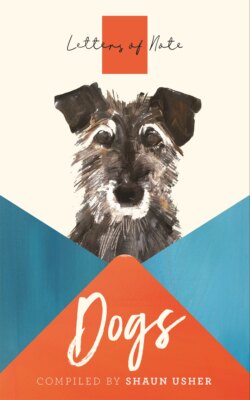Читать книгу Letters of Note: Dogs - Группа авторов - Страница 12
На сайте Литреса книга снята с продажи.
ОглавлениеLETTER 02
MY FAITHFUL DOG MIGHT BEAR ME COMPANY
Frances Power Cobbe to The Spectator
18 November 1871
Frances Power Cobbe was an Irish journalist, feminist and dog lover who spent much of her life successfully campaigning for the rights of both women and animals. In 1892, deeply affected by gruesome stories of experiments being carried out on animals, she founded the world’s first anti-vivisection organisation. Cobbe wrote numerous essays about the canine population, and in 1867 published The Confessions of a Lost Dog, an autobiography ‘written’ by her beloved Pomeranian, Hajjin. In 1871, she wrote this letter to The Spectator in response to a recent piece in the magazine on Greyfriars Bobby, a famous Skye Terrier who for fourteen years, according to legend, stood guard at the grave of his owner in Edinburgh, awaiting his return.
THE LETTER
Sir,
You ask in your last number whether “anyone can seriously doubt that Greyfriars Bobby has rejoined the master he loved so faithfully?” Pray allow me to state a reason which appears scarcely to have received the attention it deserves, for hoping that so it may be.
Admitting that many of the arguments in favour of the immortality of “the spirit of a man which goeth upward” do not apply directly to the spirit of a beast, it still holds, I apprehend, that if man’s immortality be accepted as proven, a strong presumption may be thence derived in favour of the immortality of those creatures who attain that moral stage whereat man becomes an immortal being. What that stage may be we do not presume to guess, but we cannot suppose the tremendous alternative of extinction or immortality to be decided by arrival at any arbitrary or merely physical turning-point such as may occur at various epochs either before birth or at the moment of birth. We must believe it to be determined by entrance on some moral or mental stage such as may be represented by the terms Consciousness, Self-Consciousness, Intelligence, Power of Love, or the like; by the development, in short, of the mysterious Somewhat above the purely vegetative or animated life for which such life is the scaffolding. If, then (as we are wont to take for granted), a child of some six or eighteen months old be certainly an immortal being, it follows that the stage of development which involves immortality must be an early one. And if such be the case, that stage was unquestionably attained by the dog to whose honour Miss Coutts builds her fountain. To wait till the human mind and heart have displayed the intelligence and self-sacrifice of Greyfriars Bobby, before we treat children as immortal beings, would be, I fear, to postpone that promotion rather late in life for a good many of our little darlings.
I beg that it may be remarked that this argument expressly restricts itself to the case of the higher animals, and thus escapes the objection which has always been raised to the hypothesis of the immortality of the humbler creatures, namely, that if we proceed a step below the human race we have no right to stop short of the oyster. I merely contend that where any animal manifestly surpasses an average human infant in those steps of development which can be assumed to involve existence after death, then we are logically and religiously justified in expecting that the Creator of both child and brute will show no favouritism for the smooth white skin over the rough hairy coat.
Various authorities, theological and poetical, promise us in heaven harps, jewels, palms, and flowers, all sorts of good things from the vegetable and mineral world,—only, so far as I can learn, no animals except four monstrous creatures which few of us would desire to behold. For my own part, even if it betray a completely “untutored mind,” I must confess that a world devoid of loving brutes and singing birds would seem to me wanting in a very large element of earth’s beauty and happiness; and that instead of a crown and a harp, for whose possession I have no ambition whatever, I should be very thankful to find that
“United in that equal sky,
My faithful dog might bear me company.”
I am, Sir, &c.,
PHILOZOOIST
